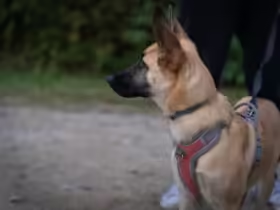As our beloved canine companions grow older, they face a range of health challenges that can affect their quality of life. Just like us, aging dogs experience changes in their bodies and may develop various conditions that require special attention. Understanding these common ailments and knowing how to manage them can help ensure that your senior dog remains comfortable, happy, and healthy in their golden years. Here are five key health challenges to watch for in aging dogs.
1. Arthritis and Joint Pain
What It Is:
Arthritis, particularly osteoarthritis, is a common condition in older dogs. It involves inflammation of the joints, leading to pain, stiffness, and reduced mobility. As dogs age, the cartilage in their joints can wear down, causing bones to rub against each other.
Signs to Watch For:
- Limping or Difficulty Walking: Your dog may have trouble getting up or moving around, particularly after rest.
- Reluctance to Exercise: They may avoid activities they once enjoyed, such as walking or playing.
- Stiffness: Look for signs of stiffness, especially in the morning or after a period of inactivity.
Management Tips:
- Weight Management: Keeping your dog at a healthy weight can reduce stress on their joints.
- Supplements: Joint supplements like glucosamine and chondroitin can help support joint health.
- Pain Relief: Consult your veterinarian about pain management options, including medications and anti-inflammatory drugs.
- Comfortable Bedding: Provide soft, supportive bedding to make resting more comfortable.
2. Dental Disease
What It Is:
Dental disease, including periodontal disease, is common in older dogs. It involves the buildup of plaque and tartar on the teeth, leading to gum inflammation, tooth decay, and bad breath.
Signs to Watch For:
- Bad Breath: Persistent bad breath is a common indicator of dental issues.
- Difficulty Eating: Your dog may have trouble chewing or show signs of pain when eating.
- Red or Bleeding Gums: Look for signs of gum inflammation or bleeding.
Management Tips:
- Regular Brushing: Brush your dog’s teeth regularly with canine toothpaste.
- Dental Check-ups: Schedule regular veterinary dental cleanings and check-ups.
- Dental Treats and Toys: Provide dental chews and toys designed to help reduce plaque buildup.
3. Cognitive Dysfunction Syndrome (CDS)
What It Is:
Cognitive Dysfunction Syndrome is similar to dementia in humans and affects a dog’s brain function. It leads to behavioral changes, confusion, and memory loss.
Signs to Watch For:
- Disorientation: Your dog may seem confused or lost in familiar environments.
- Sleep Disturbances: Changes in sleep patterns, including restless nights or increased daytime sleeping.
- Altered Behavior: Increased anxiety, changes in interactions, or a decrease in house training.
Management Tips:
- Routine and Environment: Maintain a consistent routine and a stable environment to reduce confusion.
- Mental Stimulation: Engage your dog with puzzle toys and interactive games to stimulate their mind.
- Supplements and Medications: Consult your vet about supplements or medications that may help manage symptoms.
4. Heart Disease
What It Is:
Heart disease, such as congestive heart failure, becomes more prevalent in older dogs. It affects the heart’s ability to pump blood effectively, leading to fluid buildup in the lungs and other issues.
Signs to Watch For:
- Coughing: Persistent coughing, especially at night or after exercise, may indicate heart problems.
- Difficulty Breathing: Rapid or labored breathing can be a sign of heart disease.
- Fatigue: Your dog may become more tired and less active than usual.
Management Tips:
- Regular Veterinary Exams: Regular check-ups can help detect heart disease early.
- Medication: Your vet may prescribe medications to help manage heart disease.
- Diet and Exercise: Follow your vet’s recommendations on diet and exercise to support heart health.
5. Kidney Disease
What It Is:
Kidney disease is common in older dogs and affects the kidneys’ ability to filter waste from the blood. Chronic kidney disease can lead to various symptoms and complications.
Signs to Watch For:
- Increased Thirst and Urination: Your dog may drink more water and urinate more frequently.
- Weight Loss: Noticeable weight loss despite a good appetite.
- Vomiting or Diarrhea: Digestive issues can be a sign of kidney problems.
Management Tips:
- Special Diet: A diet formulated for kidney health can help manage the condition.
- Hydration: Ensure your dog has access to fresh water at all times.
- Regular Monitoring: Frequent veterinary check-ups are essential for managing kidney disease.
Conclusion
Caring for an aging dog requires vigilance and understanding. By recognizing the signs of these common health challenges and working closely with your veterinarian, you can help manage these conditions effectively and improve your senior dog’s quality of life. Regular check-ups, a healthy diet, and appropriate treatments can make a significant difference in keeping your furry friend comfortable and happy in their later years.
Remember, your senior pup has been a loyal companion through the ups and downs of life, and with the right care and attention, you can ensure their twilight years are filled with love and joy.











Leave a Reply